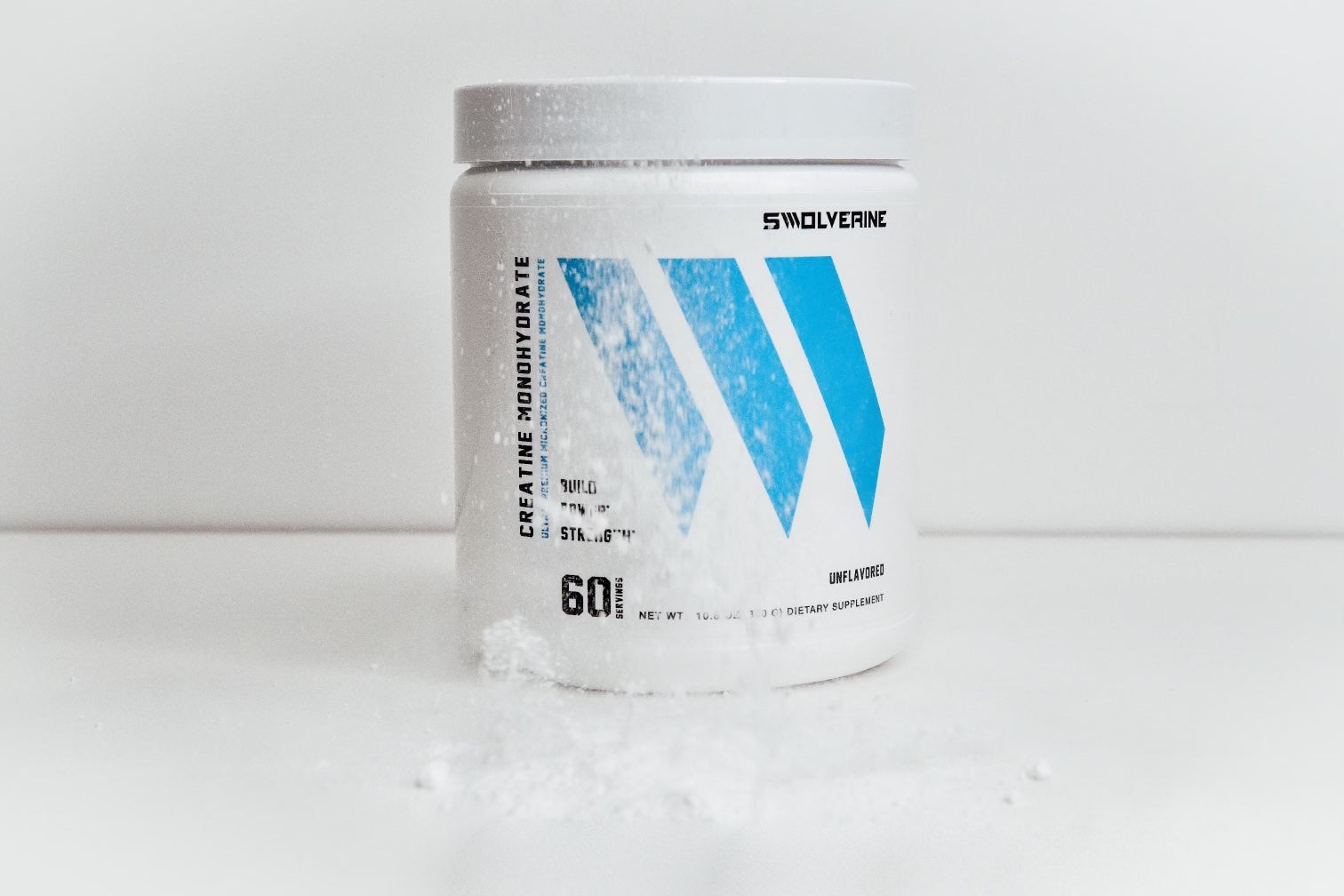Creatine monohydrate has been one of the most popular sports supplements since its inception in the early 1990s when supplement brand EAS introduced the first creatine supplement under the name Phosphagen. The rest is history. Creatine’s primary role is to create and generate Adeno-triphosphate [ATP] our body's natural energy source. Studies have shown that creatine supplementation can improve performance measures in fast-twitch muscle fibers which are recruited for movements that require quick bursts of energy such as weightlifting, sprinting, and functional training. Yet, despite the clinical evidence in support of the advantages of creatine monohydrate as an ergogenic aid, there are a few disadvantages that everyone should be aware of before deciding whether it's right for them.
Let’s look at the pros and cons of taking creatine monohydrate, so you can make a better and more informed decision before you hit the buy it now button.
What Is Creatine?
The Science Behind Creatine
Creatine is a naturally occurring molecule found within the human body. It is synthesized primarily in the liver from the amino acids glycine, arginine, and methionine and also obtained through dietary sources such as red meat and fish. Once ingested or produced, creatine is stored in the skeletal muscles as phosphocreatine, a crucial component used to regenerate adenosine triphosphate (ATP)—the body’s primary energy currency—especially during high-intensity training and explosive movements.
Creatine is widely considered one of the most effective and well-researched ergogenic aids for athletic performance. Research indicates that creatine supplementation can increase intramuscular creatine and phosphocreatine stores by 15–40%, leading to enhanced anaerobic training capacity and improved exercise performance (Buford et al., Journal of the International Society of Sports Nutrition, 2007).
Pros Of Creatine Monohydrate
1. Strength & Muscle Mass
Numerous studies have evaluated creatine's effect on strength gains and muscle hypertrophy. In a study published in Metabolism, 30 male participants were randomized into three groups:
· Creatine only (CR)
· Creatine + resistance training (CR-RT)
· Placebo + resistance training (PL-RT)
Participants in the creatine groups followed a loading phase of 20g per day for days 1–5, followed by 10g per day from days 6–28. After 28 days, both creatine-supplemented groups showed significant increases in body mass and total body water. The CR-RT group also demonstrated notable improvements in strength compared to the placebo group (Volek et al., Metabolism, 1999).
When creatine supplementation is combined with resistance training over time, it helps to:
· Increase lean body mass
· Enhance strength levels
· Improve the efficiency of ATP production, leading to better overall training performance
These gains are largely attributed to the increased availability of creatine phosphate in muscle cells, which enhances short-duration, high-intensity performance (Kreider et al., Journal of the International Society of Sports Nutrition, 2017).
Important: Ergogenic benefits only occur after creatine loading, meaning you must supplement 20g per day for 5–7 days to effectively saturate muscle creatine stores.
2. Power & Performance Output
A huge advantage and pro of creatine, is power output. Creatine supplementation has been shown to increase maximum power output—particularly during high-intensity training protocols such as CrossFit, HIIT, and sprint interval training. Studies report improvements in power production, peak output, and recovery by 5–15% during repeated bouts of exercise (Rawson & Volek, Strength and Conditioning Journal, 2003).
Short-term performance gains include:
· Increased cycling power output
· Greater total work capacity
· Enhanced time trial performance in sports such as swimming and sprinting (Branch, International Journal of Sport Nutrition and Exercise Metabolism, 2003).
Creatine Monohydrate Pros – In Summary
· Increased Strength
· Enhanced Power Output
· Improved Muscle Force
· Greater Total Work Capacity
· Elevated Muscle Mass
Creatine Monohydrate Cons
Understanding the Potential Drawbacks of Creatine Supplementation
Now that we've covered the pros of creatine monohydrate, it's time to look at the potential downsides. While creatine is one of the most researched and widely used performance supplements, it’s not without a few limitations and side effects—especially when it comes to its bioavailability, loading protocol, and individual response variability.
1. Loading Phase & Bioavailability
One of the most common critiques of creatine monohydrate is the need for a loading phase. To maximize muscle creatine saturation, studies have shown that taking 5g of creatine four times per day (20g/day) for 5–7 days results in a 20% increase in muscle creatine stores (Hultman et al., Clinical Science, 1996).
Alternatively, a lower daily dose of 12g split over 4 servings for 28 days can also achieve muscle saturation. After this initial loading period, 3–5g per day is sufficient to maintain elevated creatine levels.
However, there are key considerations:
· No performance improvements will occur until the loading phase is complete and muscles are saturated with creatine (Kreider et al., Journal of the International Society of Sports Nutrition, 2017).
· The loading phase uses up ~120g of creatine before benefits are experienced—raising concerns about waste and efficiency.
· If supplementation stops for more than four weeks, muscle creatine levels return to baseline (Harris et al., Clinical Science, 1992).
Why Does Creatine Need to Be Loaded?
Creatine monohydrate has relatively poor bioavailability because it can convert into a waste by-product called creatinine. Creatinine is formed during the metabolism of creatine, and excessive conversion can result in:
· Water retention
· Bloating
· Muscle cramps
In a head-to-head study published in the International Journal of Pharmacology, researchers examined the pH stability and creatinine conversion of creatine monohydrate versus a pH-corrected form of creatine (Kre-Alkalyn). The results showed that creatine monohydrate’s pH (2–3 in solution) creates an acidic environment where creatine immediately begins converting into creatinine. In contrast, Kre-Alkalyn exhibited negligible conversion (<0.1%) even after accelerated 6-year equivalency testing—highlighting potential bioavailability concerns with standard monohydrate forms (Stout et al., IJPRD, 2005).
2. Responders vs. Non-Responders
Not everyone experiences the same results from creatine. In a study conducted at the School of Human Kinetics at the University of British Columbia, participants supplemented with 20g of creatine for three days. Some saw a significant increase in muscle creatine stores (responders), while others saw little to no effect (non-responders).
The response was greatest in individuals with low initial creatine levels—such as vegetarians or those with low red meat intake. Meanwhile, individuals who already consume protein-rich diets (e.g., red meat, poultry, fish) may have less pronounced responses due to already elevated baseline muscle creatine concentrations (Syrotuik & Bell, Journal of Strength and Conditioning Research, 2004).
3. Water Retention & Bloating
Creatine is highly hydrophilic, meaning it attracts water. When creatine draws water into the muscle cells, it can lead to visible water retention. Users often report a feeling of bloating or puffiness—especially in the arms, legs, or abdominal region.
An increase in fat-free mass (FFM) of 1–3 kg is commonly seen with creatine monohydrate use, much of which is due to intracellular water retention rather than new muscle fiber growth (Volek et al., Medicine & Science in Sports & Exercise, 1999).
4. Cramping
While there have been many anecdotal reports and claims that creatine supplementation can cause cramping, there is no clinical evidence at this time that supports this claim. Although some athletes who are taking creatine may experience muscle cramps, there is no research indicating that their risk is greater with or without creatine supplementation.
Considering variables like study design, dosage, and duration, it’s possible that some side effects may only appear after prolonged use. However, a number of peer-reviewed studies have refuted the claim that creatine causes cramping. A position stand by the American College of Sports Medicine (ACSM, 2000) advised individuals who are exercising intensely, managing their weight, or training in hot environments to be cautious with creatine usage—not because of proven risks, but due to precautionary concerns in specific conditions (American College of Sports Medicine, 2000).
If creatine is not taken with adequate water, especially during hot weather or high-intensity workouts, it may increase the chance of dehydration, which can lead to cramping. To minimize any risk, it is essential to consume ample amounts of water and electrolytes alongside creatine supplementation.
Creatine Monohydrate: Pros and Cons
|
Pros |
Cons |
|
Proven to enhance strength, power, and high-intensity performance |
Can cause temporary water retention and weight gain |
|
One of the most researched and safest supplements available |
Some users report bloating or mild gastrointestinal discomfort |
|
Increases muscle mass by supporting cellular hydration and energy (ATP) production |
Requires consistent daily dosing for optimal results |
|
Supports quicker recovery and reduced muscle fatigue |
May take 1–2 weeks to notice performance benefits without a loading phase |
|
May offer cognitive and neuroprotective benefits |
Not suitable for individuals with certain kidney disorders (medical supervision advised) |
|
Affordable and widely available |
Misunderstood by some due to myths about safety and "bulking" |
Pros and Cons of Creatine Monohydrate
The Most Studied, But Not Without Drawbacks
With over 500 peer-reviewed studies, Creatine Monohydrate remains one of the most validated and effective sports supplements on the market. It’s consistently shown to:
- Increase muscle strength
- Enhance explosive power
- Support high-intensity training
However, it comes with a few limitations:
- Requires a loading phase
- May cause bloating or water retention
- Lower bioavailability
- Possible gastrointestinal discomfort
Kre-Alkalyn: The Creatine That Solves For The Cons Of Creatine Monohydrate
Due to the drawbacks of creatine monohydrate, alternative and superior forms of creatine have been created to address the side effects such as
- Bloating
- Water retention
- Anecdotal cramping
- Poor bioavailability
Because of these downsides, alternative forms like Kre-Alkalyn were developed to improve creatine delivery and reduce these negative effects.
What Is Kre-Alkalyn?
A pH-Correct Form of Creatine
Kre-Alkalyn is a patented pH-buffered form of creatine phosphate. It was engineered to minimize the toxic conversion to creatinine, a by-product of creatine breakdown that can lead to bloating and inefficiency.
By buffering creatine with alkaline agents specifically sodium bicarbonate, or magnesium glycerol phosphate, Kre-Alkalyn maintains a stable pH of 7–14. This stabilization helps prevent the degradation of creatine into creatinine, thus enhancing bioavailability and reducing water retention.
Key Benefits:
- No loading phase required
- Immediate performance benefits
- Less waste and greater value per dose
This means that with Kre-Alkalyn, users can experience results from day one and require lower dosages due to its enhanced absorption.
Conclusion: Choose Kre-Alkalyn Creatine
Kre-Alkalyn provides distinct advantages over traditional creatine forms. These include:
- Better bioavailability
- No loading or cycling phase
- No bloating or water retention
- Improved endurance and VO2 Max (Weil, 2004, FDA-Guided Study).
- Greater strength gains (Stoychev et al., 2006).
- Improved work capacity
- More cost-effective over time
That’s why Kre-Alkalyn has grown in popularity—it offers the same or superior benefits, but with greater convenience, no bloating, and better absorption, making it a superior creatine alternative for strength, endurance, and overall performance.







